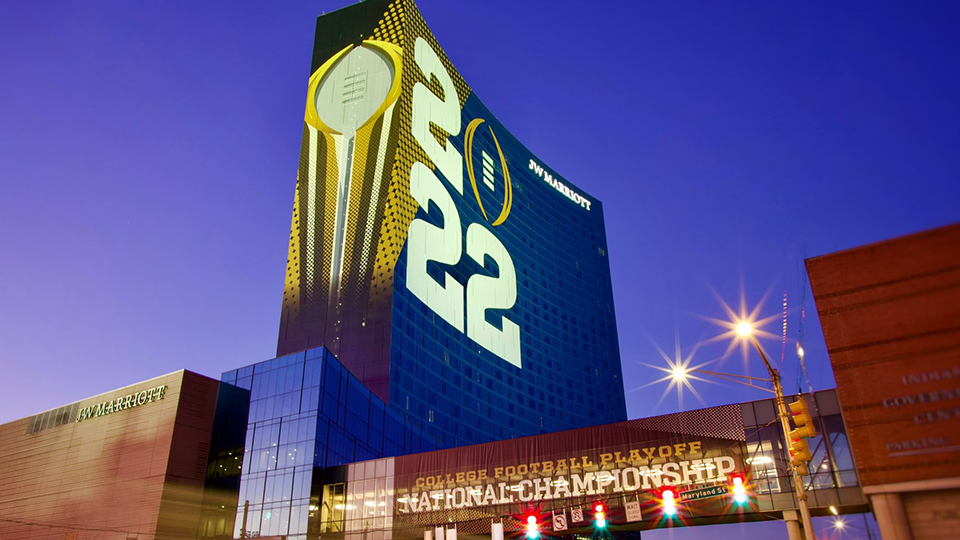Conferences, Notre Dame agree to continue College Football Playoff through 2031
Subscriber Benefit
As a subscriber you can listen to articles at work, in the car, or while you work out. Subscribe Now
The nine Bowl Subdivision conferences and Notre Dame reached an agreement Friday on a six-year deal to continue the College Football Playoff through the 2031 season, a significant step that establishes a revenue-sharing plan and allows the CFP to finalize a media rights agreement.
Executive Director Bill Hancock said the agreement doesn’t lock in a format for the CFP for 2026 and beyond, but it guarantees at least a 12-team field and five conferences having annual access to the playoff through 2031.
The playoff is expanding this season from four teams to 12, with the five highest-ranked conference champions — regardless of league — and seven at-large selections making up the field.
“Anything else regarding format is to be determined,” Hancock said.
A person who has seen the agreement told AP the plan for 2026 is for the Atlantic Coast Conference, Big Ten, Big 12 and Southeastern Conference champions to receive automatic CFP bids, along with the highest-rated champion from the five other conferences that signed the deal: the American Athletic, Conference USA, Mid-American, Sun Belt and Mountain West.
The person spoke on condition of anonymity because details of the agreement had not been made public.
The Big Ten and SEC had been pushing for models that would give their conferences multiple automatic bids, but that talk has been tabled for now.
The number of teams in the CFP could grow to 14 under the new agreement, but for now there is no plan in place and no urgency to make a decision, Hancock said.
Hancock said the conference commissioners who manage the CFP might want to let the coming season play out and evaluate the first iteration of the 12-team model.
“We’re going to take a deep breath, step back, and begin those conversations whenever it’s appropriate,” he said.
Hancock said the Pac-12, which is set to operate as a two-team league with just Washington State and Oregon State next season, didn’t sign the agreement because of its uncertainty beyond 2025.
The CFP implemented a rule recently that a conference had to have at least eight teams to be eligible to qualify for access to the playoff.
Hancock said it was unclear whether the Pac-12, if rebuilt will be able to join the agreement.
The CFP has an agreement in principle with ESPN on a new media rights agreement worth $7.8 billion that adjusts the value of the last two years of the current 12-year contract to account for more playoff games and runs through 2031.
The CFP couldn’t complete that deal without the conferences first agreeing to participate in the playoff and a revenue-sharing plan.
“We are still negotiating with ESPN,” Hancock said. “We’re encouraged about the position we are in. But we still have work to do.”
Hancock declined to give details of the revenue-sharing agreement.
It has been previously reported — and confirmed by AP — the Southeastern Conference and Big Ten will receive more than 50% of the distributed CFP revenue, with the Atlantic Coast Conference and Big 12 getting about 30% combined and the Group of Five Conferences and Notre Dame the rest.
Big Ten and SEC schools will receive an annual payout of about $22 million per year.
Notre Dame’s share will be about $12 million per year, about the same as ACC and Big 12 schools. Schools in Group of Five conferences will earn about $2 million per year.
Bonuses for participation — currently $6 million for reaching the semifinals and $4 million for other New Year’s Six bowls — will be eliminated for all but independents. Notre Dame and UConn will be the only official football independents in FBS by 2025, when Massachusetts joins the MAC.
But the deal calls for Washington State and Oregon State to be treated as non-Notre Dame independents, receiving annual payments of $360,000 per year, starting in 2026, according to another person with direct knowledge of the agreement. The schools have been making about $5 million per year in the current CFP deal as part of the Pac-12.
Washington State President Kirk Schulz and Oregon State President Jayathi Murthy said in a statement the CFP’s decision to “drastically reduce the Pac-12 Conference’s rightful share of CFP revenues” will cause the financial gap the Pacific Northwest schools are already facing to widen.
“Negotiations with the CFP continue, and we continue all options on behalf of student-athletes and our universities,” they said.
The deal also includes a look-in by 2028 that could provide an opportunity to make adjustments.
“This agreement is a really important next step for the CFP,” Hancock said. “It ensures that fans will continue to have a postseason football tournament to enjoy, and they will see the best teams in the country competing for the national championship.”
